|
|
|
Sort Order |
|
|
|
Items / Page
|
|
|
|
|
|
|
| Srl | Item |
| 1 |
ID:
076021
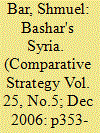

|
|
|
| 2 |
ID:
082215
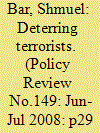

|
|
|
| 3 |
ID:
108939
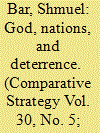

|
|
|
|
|
| Publication |
2011.
|
| Summary/Abstract |
This article discusses the influence of religion on deterrence. Faith may increase risk propensity and lower the legitimacy of being deterred. Anticipation of divine intervention, reward or punishment, adherence to an apocalyptic ideology, or (in the Shiite world) to believe in the imminent advent of the Hidden Imam reduces susceptibility to deterrent threats. Religious motivation can, however, be potentially exploited to enhance deterrence. Superstitions can induce courage and self sacrifice but may also induce fear and mass hysteria. Prophecies too are a two-edged sword; believers, who receive divine guarantees that a certain event will not happen, may lose faith in the face of the occurrence of that event.
|
|
|
|
|
|
|
|
|
|
|
|
|
|
|
|
| 4 |
ID:
150082
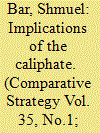

|
|
|
|
|
| Summary/Abstract |
Regardless of the outcome of the military campaign, the “Islamic State” is a watershed. Its regime derives from the personage of the Caliph as the “Substitute of the Prophet of Allah” and “Commander of the Believers.” But it seeks not to restore the model of previous Caliphates, but to resurrect the regime of the Prophet who spread Islam “with the sword” so that “the word of Allah becomes supreme.” The Caliphate paradigm is incompatible with tolerance of heterodox Muslim communities or non-Muslim citizens or with peaceful relations with other Muslim states or the non-Muslim world. It precludes a “Westphalian” order; will exacerbate the Sunni–Shiite conflict, radicalize Muslim communities across the globe, fan the flames of Islamist terrorism and will give birth to “Caliphate Archipelagos”—small groups that swear their loyalty to the Caliph and are willing to act in his name in their territories.
|
|
|
|
|
|
|
|
|
|
|
|
|
|
|
|
| 5 |
ID:
175689
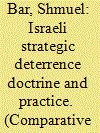

|
|
|
|
|
| Summary/Abstract |
Israel is the only country whose neighbors have threatened it for most of its existence with total eradication. Despite Israel’s military advantages, Israel’s defense doctrine views war as the “no choice option” which carries a heavy social and economic price tag. Therefore, Israeli doctrine relies heavily on the projection of deterrence. Events over the years have given rise to debates in the Israeli public regarding the “erosion” of Israeli deterrence. However, these debates are replete with fallacies. An understanding of Israeli deterrence doctrine must be based on the distinction between three national situation levels in the context of which deterrence must be achieved: “Routine”, “Emergency” and “War” and the role of “compellence” and pre-emption of offensive capabilities of the enemy as an instrument for inducing deterrence (“pre-terrence”). Ultimately, Israel has succeeded in maintaining strategic deterrence vis-à-vis neighboring states. This article provides an understanding of the evolution of Israel’s deterrence doctrine, its successes and its failures, and, mutatis mutandis, lessons that it can offer to deterrence doctrine in general and to that of the United States in particular.
|
|
|
|
|
|
|
|
|
|
|
|
|
|
|
|
| 6 |
ID:
175695
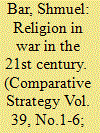

|
|
|
|
|
| Summary/Abstract |
This article argues that while decisions of religiously motivated parties in war may be “rational,” the “reality” that the decisions apply to may include transcendental elements that the nonbelievers may not perceive as “reality,” to wit; the actual involvement of the Deity or his angels in the battlefield, reward and punishment in the Afterworld for refraining from action in this world and the belief in supernatural omens and prophecy. Religious impact on war has reemerged, sometimes with redoubled strength, during the 20th and early 21st centuries. This is true in Islam, in the growing strength of the right wing in Europe and in the resurgence of religion as a factor in Putin’s Russia. The key to understanding the impact of religion on war is to understand the approach of each religious paradigm vis-à-vis initiation and waging of war (Jus ad bellum and Jus in bello) and the legitimacy of being deterred. In order to target the religious aspect of the enemy’s value system, it is necessary to know the various components of the religious belief system—the values, worldview, customs, superstitions and leadership paradigms.
|
|
|
|
|
|
|
|
|
|
|
|
|
|
|
|
| 7 |
ID:
175675
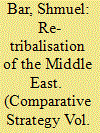

|
|
|
|
|
| Summary/Abstract |
The breakdown of nation states in the Middle East has precipitated a regression to the fundamental tribal identity. The success of al-Qaeda and ISIS later on in mobilizing the tribes for the insurgency in Iraq was due to their ability to reach out to the correct nodes of tribal influence. But their failure was also to a great extent due to their ignoring of tribal mores and sensitivities. Regimes in the region are aware of the risks of this trend, and in some countries, such as Saudi Arabia and Jordan, the leaderships are trying to strengthen the state at the expense of the tribes. Nevertheless, Iraq, Syria, Yemen and Libya have already devolved totally into “re-tribalised” societies and Jordan and Saudi Arabia are vulnerable. The Sunni-Shiite divide is also superimposed on the tribal factor as it serves to unite tribes against a common enemy. Where borders of the nation state remain intact, they now co-exist with fuzzy areas of tribal influence with minimal governance.
|
|
|
|
|
|
|
|
|
|
|
|
|
|
|
|
|
|
|
|
|